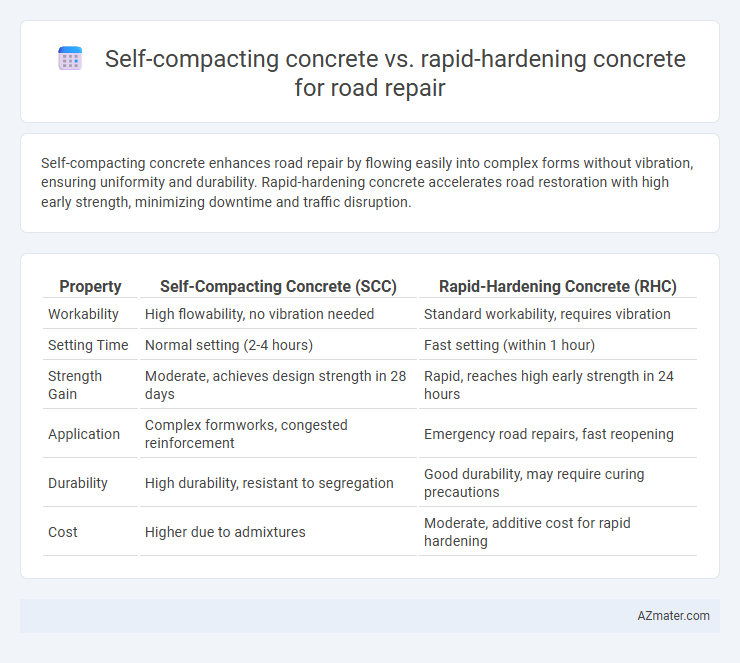Self-compacting concrete enhances road repair by flowing easily into complex forms without vibration, ensuring uniformity and durability. Rapid-hardening concrete accelerates road restoration with high early strength, minimizing downtime and traffic disruption.
Table of Comparison
| Property | Self-Compacting Concrete (SCC) | Rapid-Hardening Concrete (RHC) |
|---|---|---|
| Workability | High flowability, no vibration needed | Standard workability, requires vibration |
| Setting Time | Normal setting (2-4 hours) | Fast setting (within 1 hour) |
| Strength Gain | Moderate, achieves design strength in 28 days | Rapid, reaches high early strength in 24 hours |
| Application | Complex formworks, congested reinforcement | Emergency road repairs, fast reopening |
| Durability | High durability, resistant to segregation | Good durability, may require curing precautions |
| Cost | Higher due to admixtures | Moderate, additive cost for rapid hardening |
Introduction to Modern Road Repair Techniques
Modern road repair techniques increasingly utilize self-compacting concrete and rapid-hardening concrete due to their efficiency and performance benefits. Self-compacting concrete offers superior flowability and eliminates the need for vibration, reducing labor and improving finish quality in complex repair scenarios. Rapid-hardening concrete accelerates curing time, allowing roads to reopen faster and minimizing traffic disruption during urgent repairs.
What is Self-Compacting Concrete (SCC)?
Self-Compacting Concrete (SCC) is a highly flowable, non-segregating concrete that spreads into place and around reinforcement without mechanical vibration, making it ideal for complex road repair applications. SCC's superior workability reduces labor costs and shortens project timelines while maintaining high strength and durability essential for road surfaces. Its enhanced fluidity ensures uniform compaction, minimizing voids and improving the longevity of repaired pavement structures.
What is Rapid-Hardening Concrete (RHC)?
Rapid-Hardening Concrete (RHC) is a specialized cement mix designed to achieve high early strength within hours, enabling faster road repair and reopening. Its formulation typically includes rapid-setting cement and additives like calcium chloride, which accelerate hydration and reduce curing time to as little as 3 to 6 hours. RHC is ideal for emergency pavement patches and high-traffic areas where minimizing downtime is critical.
Key Material Properties: SCC vs RHC
Self-compacting concrete (SCC) offers high flowability and excellent self-leveling capabilities without the need for vibration, making it ideal for complex road repairs requiring precise placement. Rapid-hardening concrete (RHC) achieves high early strength within hours due to its special cement composition, enabling faster traffic reopening and reduced downtime on road construction sites. SCC's superior workability contrasts with RHC's accelerated curing time, both critical factors influencing the selection based on project timelines and structural demands.
Placement and Workability Comparison
Self-compacting concrete (SCC) offers superior workability with its high flowability and ability to fill intricate molds and tight spaces without segregation or the need for vibration, making it ideal for complex road repair scenarios. Rapid-hardening concrete (RHC) provides fast strength gain, enabling quick reopening of roads but often requires mechanical consolidation due to lower fluidity and reduced workability. Placement of SCC minimizes labor and equipment while ensuring uniform compaction, whereas RHC demands precise timing and handling to balance rapid setting with adequate workability.
Setting Time and Strength Development
Self-compacting concrete (SCC) offers excellent workability and flows easily into intricate road repair forms without vibration, yet it typically exhibits a standard setting time of 2 to 4 hours and strength development reaching 70% of its 28-day strength within 7 days. Rapid-hardening concrete (RHC) achieves initial set in as little as 20 to 40 minutes and attains over 70% of its 28-day compressive strength within 24 hours, enabling faster traffic reopening. For road repair applications prioritizing minimal downtime, RHC excels due to its accelerated setting time and rapid strength gain, while SCC provides superior placement ease and surface finish quality.
Durability and Long-Term Performance
Self-compacting concrete (SCC) exhibits superior durability in road repair due to its high flowability, which ensures complete consolidation without segregation or honeycombing, leading to enhanced resistance against environmental stressors and reduced permeability. Rapid-hardening concrete achieves early strength gain within 6 to 12 hours, allowing for quicker traffic reopening, but its long-term performance may be compromised by increased shrinkage and potential cracking if not properly cured. For sustained road durability, SCC offers better long-term structural integrity, while rapid-hardening concrete is optimal for projects requiring minimal downtime but may necessitate additional maintenance over time.
Cost Efficiency and Project Timeline
Self-compacting concrete offers superior cost efficiency in road repair by reducing labor and equipment needs due to its flowable nature that eliminates the requirement for vibration, speeding up the placement process. Rapid-hardening concrete significantly shortens project timelines with its accelerated setting and early strength gain, allowing for quicker reopening of roads and reduced traffic disruption. Balancing self-compacting concrete's labor savings with rapid-hardening concrete's fast curing times can optimize both budget and schedule in road repair projects.
Suitability for Different Road Repair Scenarios
Self-compacting concrete (SCC) offers exceptional flowability and superior workability, making it ideal for complex road repairs where access is limited and vibration is impractical, ensuring uniform filling and reducing labor time. Rapid-hardening concrete (RHC) provides accelerated strength gain, allowing roads to reopen quickly, which is crucial for emergency repairs and high-traffic areas requiring minimal downtime. The choice between SCC and RHC depends on project-specific needs such as repair complexity, time constraints, and durability requirements for sustainable road restoration.
Selecting the Best Concrete Solution for Road Repairs
Self-compacting concrete offers superior flowability and eliminates the need for vibration, making it ideal for complex road repair shapes and constrained sites. Rapid-hardening concrete enables faster curing times, restoring road functionality within hours and minimizing traffic disruption. Selecting the best concrete solution depends on project-specific factors such as repair size, time constraints, and load-bearing requirements to optimize durability and efficiency.

Infographic: Self-compacting concrete vs Rapid-hardening concrete for Road Repair
 azmater.com
azmater.com